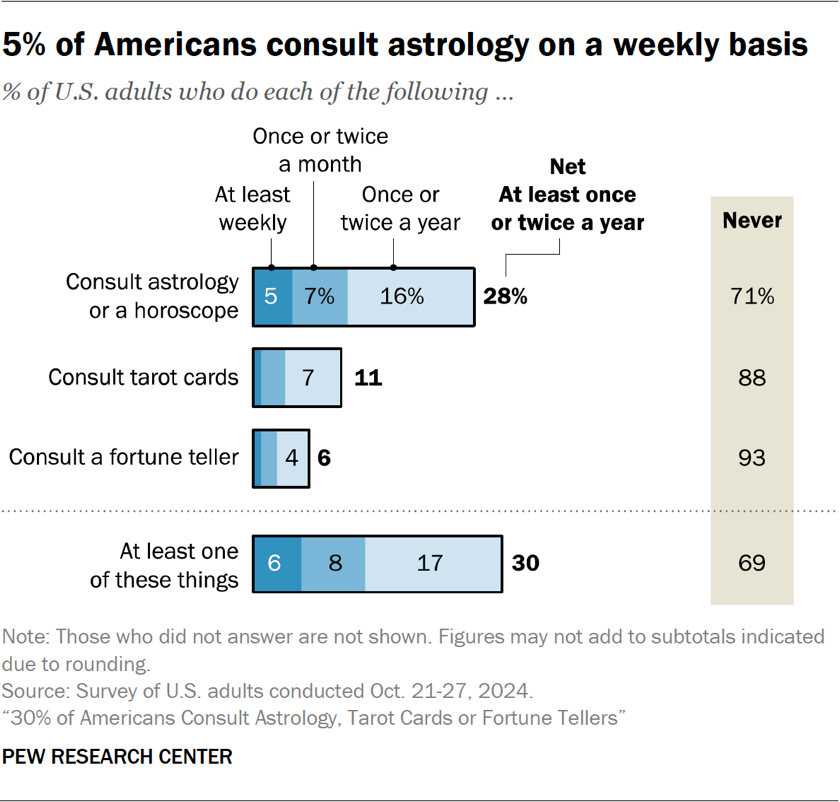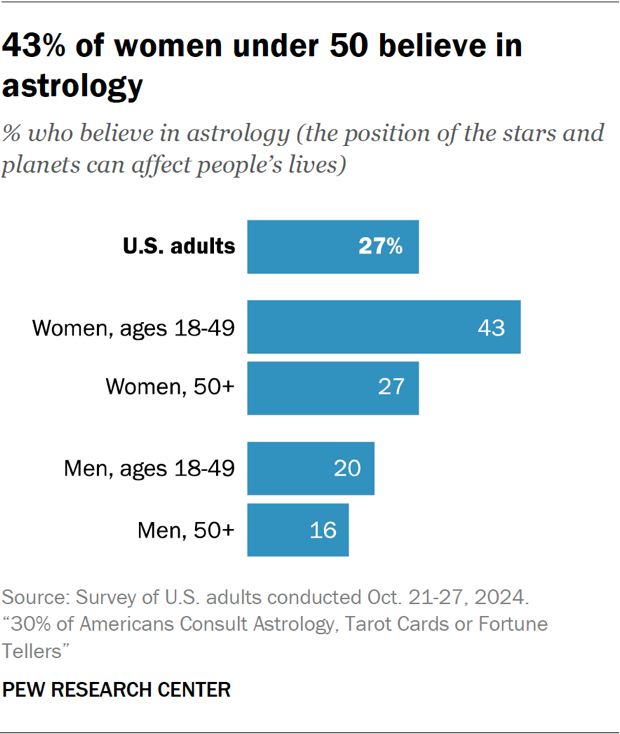Most say they engage in these practices for fun, rather than for insights or guidance on life decisions  Over the past decade, media reports have described rising popular interest in New Age practices such as astrology, tarot card reading and fortune-telling. These practices are frequently associated with young people, and they have developed their own social media cultures on TikTok and other platforms, especially during the period of social distancing brought on by the COVID-19 pandemic. So, how popular are these practices, and why do Americans engage in them? A fall 2024 Pew Research Center survey finds that 30% of U.S. adults say they consult astrology (or a horoscope), tarot cards or a fortune teller at least once a year, but most do so just for fun, and few Americans say they make major decisions based on what they learn along the way.  Here are other key takeaways from the nationally representative survey of 9,593 U.S. adults. Despite recent attention to astrology, the number of Americans who believe in astrology doesn’t appear to have changed very much in recent years. On the new survey, 27% of U.S. adults say they “believe in astrology (the position of the stars and planets can affect people’s lives).” That is not significantly different from what we found when we asked an identical question in 2017 (29%). And, although the results of earlier surveys may not be directly comparable because of differences in methodology, Gallup polls from 1990 to 2005 consistently found that between 23% and 28% of Americans believed in astrology.1 On most questions we asked about these practices, there are big differences by age and gender. Younger adults – and especially younger women – are more likely to believe in astrology and to consult astrology or horoscopes. For example, 43% of women ages 18 to 49 say they believe in astrology. That compares with 27% of women ages 50 and older, 20% of men ages 18 to 49, and 16% of men who are 50 and older.  Americans who identify as lesbian, gay, bisexual or transgender (LGBT) are especially likely to consult astrology or a horoscope, and tarot cards.2 About half of LGBT Americans (54%) consult astrology or a horoscope at least yearly – roughly twice the share among U.S. adults overall (28%). And LGBT women are more likely than LGBT men to consult astrology at least yearly (63% vs. 40%). In addition, 33% of LGBT adults say they consult tarot cards – making them three times as likely as U.S. adults overall to say this (11%). And 21% of LGBT Americans say that when they make major life decisions, they rely at least a little on what they’ve learned from astrology or a horoscope, tarot cards, or a fortune teller. While there is limited academic research on the topic, media publications focused on LGBTQ+ issues have described the prevalence of New Age practices in the LGBTQ+ community. Yet, most Americans who engage in astrology, tarot cards or fortune-telling say they do it for fun, rather than for insights or guidance on life decisions. Overall, 20% of U.S. adults say they engage in at least one of these activities mostly “just for fun,” while 10% say they do them mostly because they “believe the practices give them helpful insights.” Relatively few Americans make major life decisions based on what they learn from astrology, tarot cards or fortune tellers. Just 1% of U.S. adults say they rely a lot on what they have learned from these practices when making major life decisions. An additional 5% say they rely a little on what they have learned. Fewer than one-in-ten Americans engage in these practices on a weekly basis. While there are now abundant ways – both online and in person – to consult a horoscope, tarot cards and fortune tellers, just 6% of Americans report that they participate in one or more of these activities at least weekly. More (14%) say they engage monthly in at least one of these practices. Read on to learn more about how different demographic groups answer questions about:
|
